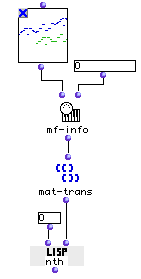OpenMusic Reference
mf-info

mf-info
(midi module) -- creates a tree describing a MIDI file
Syntax
mf-info self &optional tracknum
Inputs
| name | data type(s) | comments |
|---|---|---|
| self | an OM Midifile object | |
| tracknum | an integer | optional; must be between 0 and 15, inclusive. Causes mf-info to analyze only one track within the file. |
Output
| output | data type(s) | comments |
|---|---|---|
| first | a tree |
Description
mf-info returns a tree describing a MIDI file. Unless you use the optional input tracknum to isolate a single track, the highest level of the tree is a list of tracks. Each track is a list of notes. Each of the notes is a list of parameters in the form:
( note, onset, duration, velocity, channel )
note is the MIDI note number, where middle C is 60. Note that this value is not in midicents.
onset is the time the note begins, measured from the beginning of the file in milliseconds.
duration is the duration of the note, measured in milliseconds.
velocity is the velocity of the note, a value between 0 and 127.
channel is the MIDI channel the note is played on, from 1 to 16.
 |
OM and MIDI |
|---|---|
OM can be configured to communicate with any MIDI device. See the chapter on configuring Midishare for more information.
Examples
Extracting note numbers from a Midifile

Here we’ll use mf-info to isolate the MIDI note numbers of a Midifile. mf-info is set to return a description of the first track only (0 at second input). This list of lists is passed to mat-trans , which returns a tree in which the first element is a list of all the first elements of the sublists of the input (see the entry on mat-trans for more information). Since the first parameter of the note lists is the MIDI note value, the first list in the output of mat-trans will be a list of all the MIDI note values. We take this first element with the nth function. Changing the first input of nth from 0 to 2, for example would return a list of all the note durations in the sequence.
| Prev | Home | Next |
|---|---|---|
| merger | Up | midi-o |